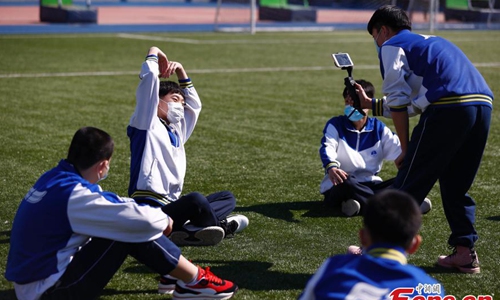
Students are seen on playground at a junior high school in Fengtai district in Beijing, May 11, 2020. More than 80,000 students in their final year at junior high schools in Beijing returned to school on Monday. (Photo: China News Service/ Jiang Qiming)
China is facing a severe challenge in terms of classroom epidemic prevention amid the gradual resumption of in-school classes, China's Ministry of Education said during a press briefing Tuesday. The ministry said in total of 150 to 200 million students will return to school at the end of May in an orderly manner.
The epidemic prevention and control in the education system has shifted from "positional warfare" to "mobile warfare," Wang Dengfeng, a spokesperson from the ministry told the media on Tuesday.
He admitted the risk and challenge comes from more unavoidable extensive and large-scale movement and gathering activities in schools. The risk of asymptomatic infections, management of foreign students, less clothing and more body exposure in warmer weather, and even people's anxiety, may all contribute to greater risk of infection.
There is one confirmed case and 14 asymptomatic infections under observation across China's education system, which has 278 million students and 17 million faculty members, China News Service reported.
Chu Zhaohui, a research fellow at the National Institute of Education Sciences, told the Global Times on Tuesday that classroom study needs to be resumed under the premise of ensuring students' health and safety and full preparations. Measures should be flexible and fit the real situation of each region.
According to the ministry, more than 107 million students or 39 percent of the total number had resumed classes in the Chinese mainland by Monday, including 2.9 million college students, 21 million high school students, 43.8 million pupils and 4.6 million kindergarten children. Colleges and universities have reopened in most of regions except Beijing Municipality, and Hebei, Shandong, Hubei and Heilongjiang provinces.
Chu noted that regions that have a relatively low risk of domestic epidemic rebound, few imported infections and low population density could resume classroom study after health authorities ensure that it is safe.
"There must be a balance between epidemic control and classroom study, as some students in remote areas do not have the convenience of various ways for acquiring knowledge. They rely on the classroom," Chu said.
As for big cities like Beijing, Chu suggests schools and health authorities work together and be fully prepared if any incident occurs.
According to the China News Service, the ministry requires the suspension of all sporting events and activities in schools that might cause mass gatherings. Moreover, peak time management, and monitoring of health status of students, teachers and their family members will be strengthened.
The cost of education would be huge if students still don't go to school. The national health publicity work has been done very well, and many children have formed hygiene habits and self-protection awareness, said Chu. Even though there will be gatherings at schools, students will remain safe as long as there is no source of infection, he said.
Wang said education authorities have put safety and health of teachers and students first, and have carefully deployed arrangements, and will timely adjust and improve the measures and policies to ensure safe and orderly reopening of schools.

